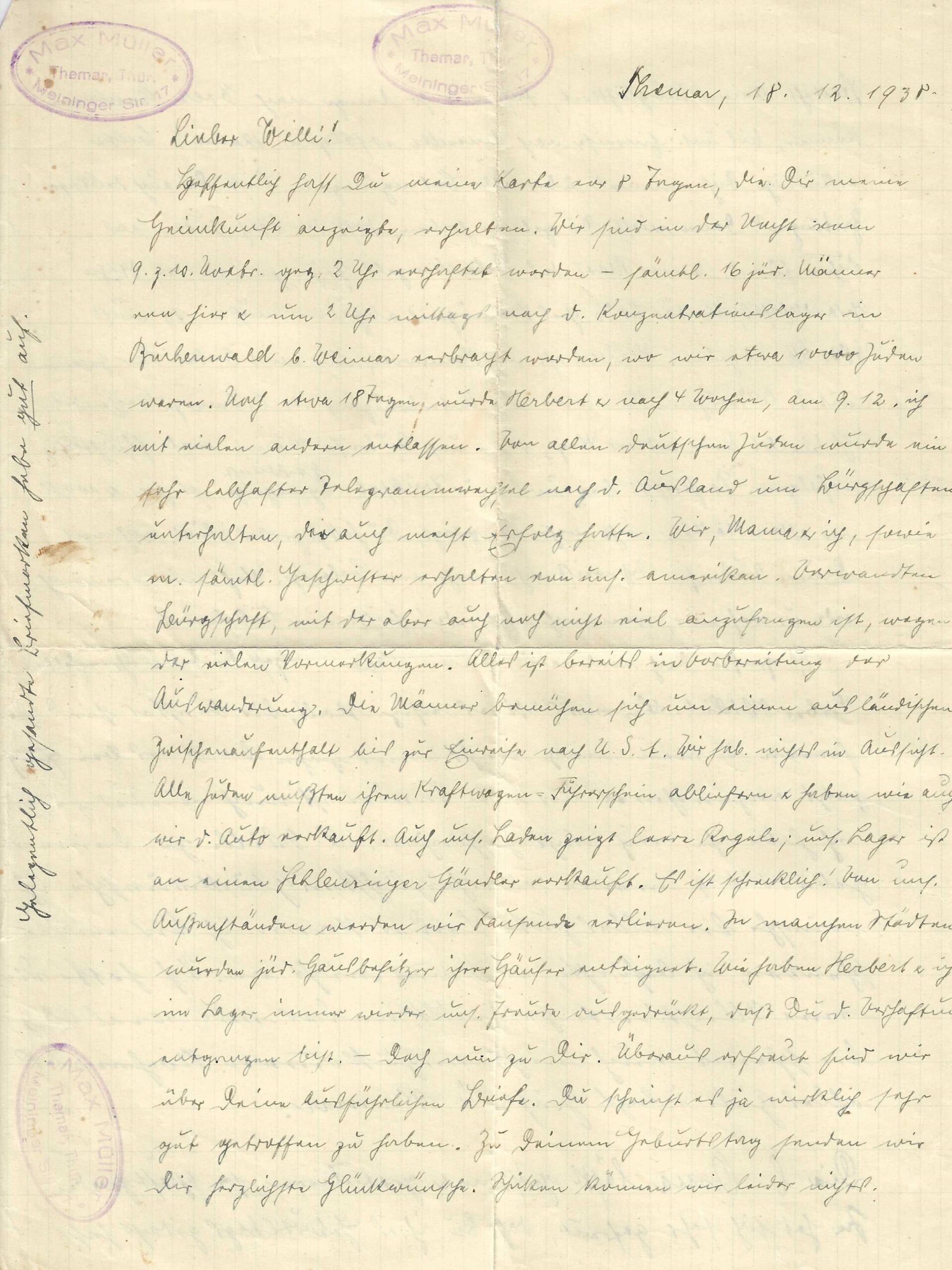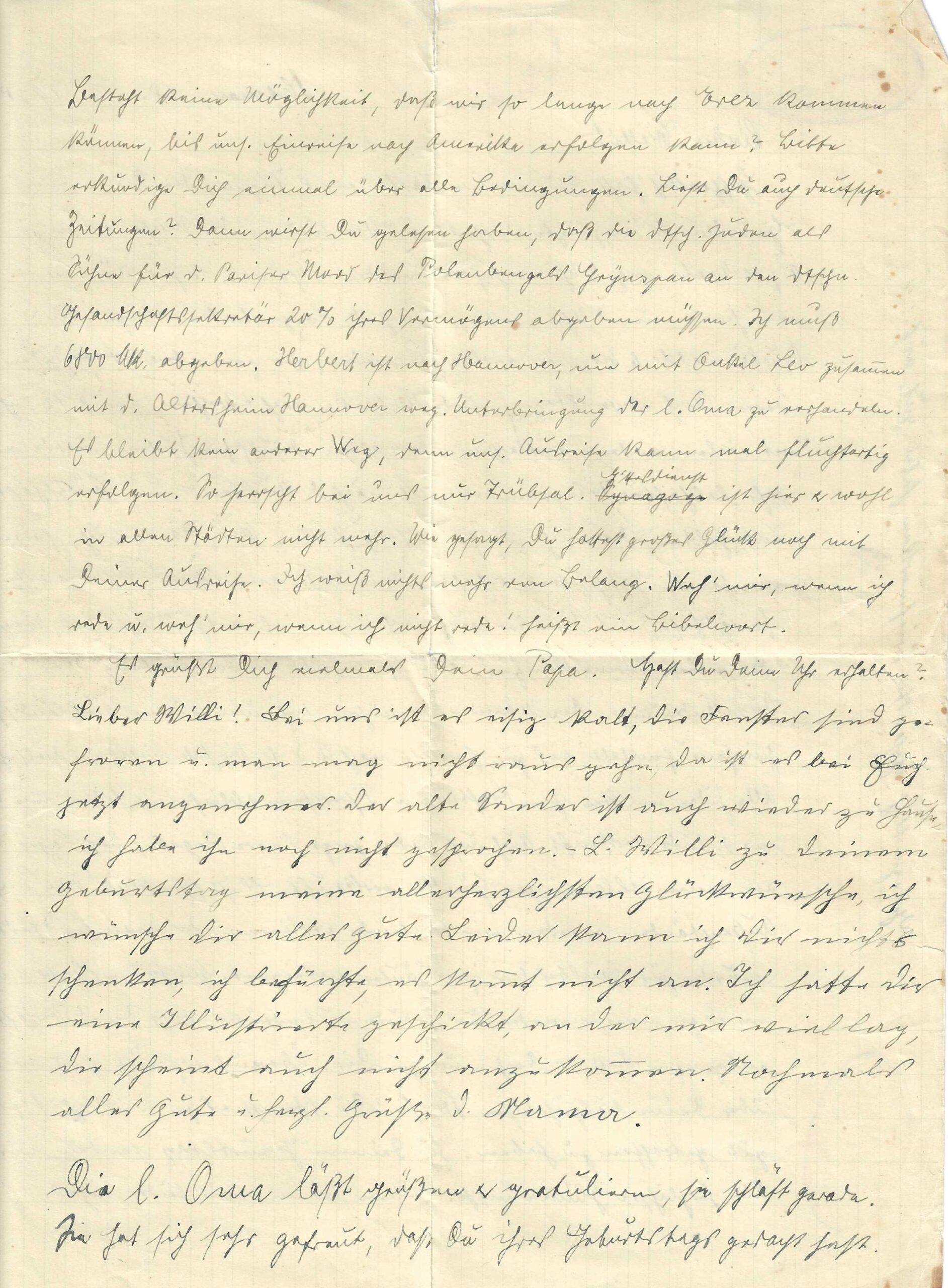0 | 1 | 2 | 3 | 4 | 5 | 6 | 7 | 8 | 9 | 10 | 11 | 12 | 13 | 14 | 15 | 16 | 17 | 18 | 19 | 20 |21 | 22| 23 | 24 | 25 | 26 | 27 | 28 | 29 | 30 | 31 | 32 | 33 | 34 | 35 | 36 | 37 | 38 | 39 | 40 | 41 | 42 | 43 | 44 | 45 | 46 | 47 | 48 | 49 | 50 | 51 | 52 | 53 | 54 | 55 | 56 | 57 | 58 | 59 | 60 | 61 | 62 | 63 | 64 | 65 | 66 | 67 | 68 | 69 | 70 | 71 | 72 | 73 | 74 | 75 | 76 | 77 | 78 | 79 | 80 | 81 | 82 | 83 | 84 | 85 | 86 | 87
Lieber Willi!
Hoffentlich hast Du meine Karte vor 8 Tagen, die Dir meine Heimkunft anzeigte, erhalten. Wir sind in der Nacht vom 9. a.[uf] 10. Nov[em]b[e]r geg.[en] 2 Uhr verhaftet worden – sämtl.[iche] 16 jä[jährige] Männer von hier & um 2 Uhr mittags nach d.[em] Konzentrationslager in Buchenwald b.[ei] Weimar verbracht worden, wo wir etwa 10000 Juden waren. Nach etwa 18 Tagen, wurde Herbert u.[nd] nach 4 Wochen, am 9.12., ich mit vielen andern entlassen. Von allen deutschen Juden wurde ein sehr lebhafter Telegrammwechsel, nach d.[em] Ausland um Bürgschaften unterhalten, der auch meist Erfolg hatte. Wir, Mama & ich, sowie m.[eine] sämtl.[ichen] Geschwister erhalten nun uns.[erer] amerikan.[ischer] Verwandten Bürgschaft, mit der aber auch noch nicht viel anzufangen ist, wegen der vielen Vormerkungen. Alles ist bereits in Vorbereitung der Auswanderung. Die Männer bemühen sich um einen ausländischen Zwischenaufenthalt bis zur Einreise nach U.S.A. Wir hab.[en] nichts in Aussicht. Alle Juden mußten ihren Kraftwagen-Führerschein abliefern & haben wie auch wir d. Auto verkauft. Auch uns. Laden zeigt leere Regale; unser Lager ist an einen Schleusinger Händler verkauft. Es ist schrecklich! Von uns. Außenständen werden wir tausende verlieren. In manchen Städten wurden jüd.[ische] Hausbesitzer ihrer Häuser enteignet. Wie haben Herbert u.[nd] ich im Lager immer wieder uns. Freude ausgedrückt, daß Du d. Verhaftung entgangen bist. – Doch nun zu Dir. Überaus erfreut sind wir über deine ausführlichen Briefe. Du scheinst es ja wirklich sehr gut getroffen zu haben. Zu Deinem Geburtstag senden wir die herzlichsten Glückwünsche. Schicken können wir leider nichts.
[Seitlich: Gelegentlich gesandte Briefmarken hebe gut auf]
Besteht keine Möglichkeit, daß wir so lange nach Erez kommen können, bis uns. Einreise nach Amerika erfolgen kann? Bitte erkundige Dich einmal über alle Bedingungen. Liest Du auch deutsche Zeitungen? Dann wirst du gelesen haben, daß die dtsch. [= deutschen] Juden als Sühne für d.[en] Pariser Mord des Polenbengels Grynspan an den dtsch. [= deutschen] Gesandschaftssekretär 20% ihres Vermögens abgeben müssen. Ich muß 6800 RM abgeben. Herbert ist nach Hannover, um mit Onkel Lev zusammen mit d.[em] Altersheim Hannover wg. [= wegen] Unterbringung der l.[ieben] Oma zu verhandeln. Es bleibt kein anderer Weg, denn uns. Ausreise kann mal fluchtartig erfolgen. So herrscht bei uns nur Trübsal. Synagoge Gottesdienst ist hier wohl in allen Städten nicht mehr. Wie gesagt, Du hattest großes Glück noch mit Deiner Ausreise. Ich weiß nichts mehr von Belang. Weh‘ mir, wenn ich rede u.[nd] weh‘ mir, wenn ich nicht rede! Heißt ein Bibelwort.
Es grüßt Dich vielmals Dein Papa. Hast Du Deine Uhr erhalten?
Lieber Willi! Bei uns ist es eisig kalt, die Fenster sind gefroren u.[nd] man mag nicht raus gehen, da ist es bei Euch jetzt angenehmer. Der alte Sander [Louis Sander, der Vater von Norbert u. Marion Sander] ist auch wieder zu Hause, ich habe ihn noch nicht gesprochen. L.[ieber] Willi zu deinem Geburtstag meine allerherzlichsten Glückwünsche, ich wünsche dir alles gute. Leider kann ich Dir nichts schenken, ich befürchte, es kommt nicht an. Ich hatte Dir eine Illustrierte geschickt, an der mir viel lag, die scheint auch nicht anzukommen. Nochmals alles Gute u.[nd] herzl. Grüße d. Mama.
Die l.[iebe] Oma läßt grüßen & gratulieren, sie schläft gerade. Sie hat sich sehr gefreut, daß Du ihres Geburtstags gedacht hast.
*****
Themar, 18th of December, 1938.
Dear Willi!
I hope you have received my postcard announcing my homecoming to you eight days ago. In the night from the 9th to the 10th of November1This is the date of the infamous ‘Reichskristallnacht’ (‘Reich wide Night of Broken Glass’) or ‘Reichspogromnacht’ (‘Reich wide Night of Pogroms’), in English usually called ‘the November pogroms’, which happened all over Germany at the exact same time., around 2 a.m., we have been arrested. Some 16-year-olds were among those arrested. We were taken at 2 p.m. to the Concentration Camp at Buchenwald near Weimar, where there were around 10.000 Jews altogether. After 18 days, Herbert was released, and after four weeks, on the 9th of December, I have been released together with many others. All the German Jews had a lively exchange of telegrams with foreign countries to receive financial guarantees to support our emigration and most were successful. We, Mama and I, as well as all my siblings, have received securities from our American relatives, which isn’t really useful just yet because of the many reservations. Everything is already being prepared for emigration. The men are trying to find a temporary stopover station until they can enter the U.S.A. We have nothing in prospect. All Jews had to give up their driver’s licence, and we have sold the car as well. The shelves in our store are empty. It is terrible! We will lose thousands in accounts receivable. In some cities, Jewish house owners have been expropriated. How Herbert and I have, in the camp, over and over again rejoiced to know that you escaped arrest. Well, now to you. We are very happy with your many detailed letters. It seems, you are doing very well. We send you wholehearted congratulations for your birthday. Unfortunately, we cannot send you anything.
[On the side: Keep the post stamps you keep receiving well]
Is there any possibility that we could come to Erez [Palestine] until we can emigrate to America? Please make inquiries about all the requirements. Do you also read German newspapers? If so, you will have read, that the German Jews, as atonement for the murder committed by the Polish boy2‘Polenbengel’ is very dismissive terminology (‘Bengel’ would be some kind of no – good , unbehaving street kid or urchin ), implying a certain contempt towards Poles in general Grynspan against the German Embassy Secretary in Paris, have to pay 20% of their assets [to the state]. I must pay 6.800 Reichsmark. Herbert went to Hannover and with Uncle Lev [Leo Nussbaum, Clara’s brother who lived in Hannover] made the arrangements for dear Granny [Bertha Nussbaum, née Stern] in a nursing home. There is no other way because our emigration could happen in a hurry. So, only misery reigns among us. It seems that there is no synagogue3Using ‘church’ or ‘synagogue’ as a synonym for ‘worship service’ is very common in German everyday language (as in: ‘After church, we go to lunch’), though this is considered unrefined, which is probably why the word was crossed out and replaced here worship service anymore in any city. As mentioned, you were very lucky to get out in time. I don’t know anything else of importance. Woe me, if I speak and woe me, if I don’t! says the bible.4This might (or might not) refer to J ob 16,6
Many greetings, your father. Did you receive your watch?
Dear Willi, it is freezing here. The windows are frozen over, and one does not want to leave the house. You have it more comfortable in this regard. Old [Lous] Sander is also back home, I haven’t talked to him yet. Dear Willi, I congratulate you wholeheartedly to your birthday and I wish you all the best. Unfortunately, I cannot give you a gift, as I don’t think it would arrive. I sent you a magazine, which meant a lot to me, but that also doesn’t seem to have arrived. Again, all the best and cordial greetings, your mother.
Dear Grandma greets you and congratulates you, she is sleeping right now. She was very happy that you thought about her birthday.
Notes:
1. The purpose of Kristallnacht/Reichspogromnacht was to force more Jews to leave Germany. If they could show evidence that applications to emigrate/iimmigrate were in process, they were released. This explains „the lively exchange of telegrams“ which Max describes
2. Herbert Sweed, b. 1887, a cousin of Max Müller who lived in California arranged for Bürgschaften/financial guarantees for the children (and their spouses) of Nathan and Bertha (née Schwed) who were trying to leave Germany: these were Hermann Müller in Eschwege; Karoline Goldmeier (née Müller in Fulda; Else Nussbaum, née Müller, in Hersfeld; Max Müller in Themar; and Sebald Müller in Nürnberg. The only one to escape Germany was Else Nussbaum who left Lisbon in August 1941.
3. Louis Sander was the widower of Hilda Sander, née Frankenberg, who had died in March 1938. He was father of Norbert Sander (1921) and Marion (1923) Sander. Louis was able to escape Germany and find refuge in Shanghai China until the end of the war.
0 | 1 | 2 | 3 | 4 | 5 | 6 | 7 | 8 | 9 | 10 | 11 | 12 | 13 | 14 | 15 | 16 | 17 | 18 | 19 | 20 |21 | 22| 23 | 24 | 25 | 26 | 27 | 28 | 29 | 30 | 31 | 32 | 33 | 34 | 35 | 36 | 37 | 38 | 39 | 40 | 41 | 42 | 43 | 44 | 45 | 46 | 47 | 48 | 49 | 50 | 51 | 52 | 53 | 54 | 55 | 56 | 57 | 58 | 59 | 60 | 61 | 62 | 63 | 64 | 65 | 66 | 67 | 68 | 69 | 70 | 71 | 72 | 73 | 74 | 75 | 76 | 77 | 78 | 79 | 80 | 81 | 82 | 83 | 84 | 85 | 86 | 87

